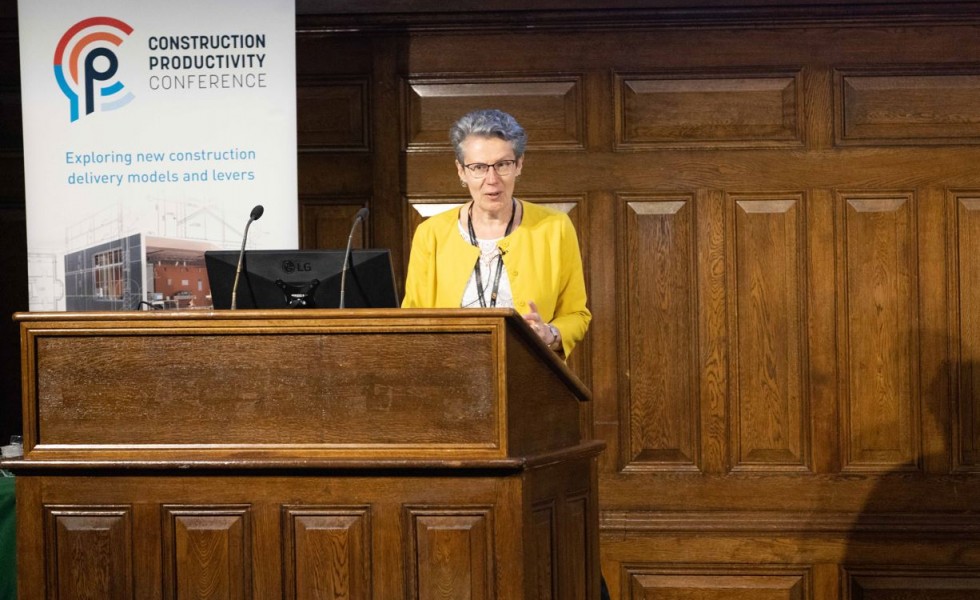Construction Productivity: Addressing the Challenges Head On
20/11/24
The Construction Productivity Conference will get to the core of an issue which has plagued the construction industry for decades. Taking place on 28 January 2025 in central London, the hard-hitting conference programme looks to address the UK construction 'productivity puzzle' head on.
With rising building costs, reducing margins and increasing risk profiles – attempts to improve productivity have proven difficult in a sector too often defined by low profits, aggressive procurement practices, talent shortages and uncertain work pipelines.
But critical to 'get Britain building again' the construction sector must significantly increase productivity. According to government statistics, since 1997 the annual rate of improvement has been circa 21% lower than the wider economy. The Construction Productivity Conference will take a forensic look at the issues affecting efficiency and growth rates, focusing on root causes and possible solutions – IT/digital adoption, culture and behaviour, capacity, skills and training, policy and investment, measurement techniques, resource effectiveness, and smart business strategies.
The industry has acknowledged the problem and there are various initiatives designed to drive change. In 2020 the Construction Productivity Taskforce was launched, bringing together clients, contractors, supply chains and consultants to identify and trial new ways of making the sector more productive. This has resulted in the Private Sector Construction Playbook, a measurement framework and guiding principles distilled from best practice and collective experience from leading companies across the sector.
But four years on, are these initiatives just ramping up the rhetoric or really driving incremental change? The successes and failures will be interrogated and debated during frank and open discussions at the conference, led by industry leading lights that are successfully challenging the status quo.
Closing the Productivity Gap
The government is reliant on the private sector to reach the stretching targets to build at least 300,000 new homes a year across the lifetime of this parliament. This represents a major opportunity for the sector but is the construction industry up to the job?
More recently, the Construction Leadership Council (CLC) set the industry the challenge to close the productivity gap between construction and the rest of the UK industries by 2035. The CLC make the case that doing this offers 'one of the biggest and most easily deliverable opportunities to grow the UK economy' generating an additional £45billion of added value each year for the wider economy – equivalent of 2% of GDP.
Against this backdrop a recent RICS Productivity Survey found that over one in five respondents from the UK and Ireland construction sector said they never measure productivity. So how can efficiencies be made if output is not assessed? The construction sector needs to sharpen up. Can you imagine managers in the manufacturing sector saying they never measure workflows?
Key Conference Themes
By scrutinising the sum of the parts that have a major impact on productivity or the lack of it, the conference programme will take a deep dive into technological advancements, improving skills and training, streamlining collaboration and regulations, and investing in innovative offsite manufacturing and industrialised construction methods. A coordinated approach that addresses these challenges holistically can unlock significant productivity gains, driving long-term success in the industry.
The Need for Speed
The aim of the Construction Productivity Conference is to explore how offsite manufacturing and industrialised construction backed by digital technologies can in practical terms boost effectiveness. The RICS Productivity Survey undoubtedly signals that modern construction methods are very much part of the solution.
There is clearly no 'silver bullet' but improving speed and quality of output through offsite construction can significantly increase productivity by shifting much of the work to controlled factory environments where production is constantly measured and scrutinised. Reducing build times by circa 30 per cent and material costs by 20 per cent, taking the construction process offsite offers vast savings in time, costs and mitigates onsite delays caused by weather and labour shortages. But traditional construction practices will need to evolve in parallel too if the improvements offered are to be realised.
Analysing Success
The conference will interrogate the issues affecting productivity but most importantly, will also analyse success stories. The UK is increasingly reliant on a narrow group of high-performing companies to drive its productivity growth. The most efficient 10 per cent of companies, dubbed 'frontier' businesses by the ONS — produced nearly four times as much output compared with those of average productivity. Scrutinising and understanding these success stories will be right at the top of the Construction Productivity Conference agenda.
Secure Your Place
Taking place on 28 January 2025 in central London, the Construction Productivity Conference pulls no punches and looks to address the 'productivity puzzle' head on. Tickets are £245 + VAT which includes access to the conference, pop-up exhibition and networking area, lunch and refreshments throughout the day. For the full speaker lineup and to secure your place, head to: www.constructionproductivity.co.uk
Source: Tall Buildings Magazine - Issue 6 by Radar Communications - Issuu

